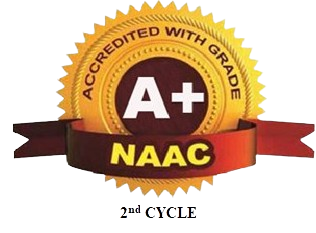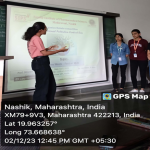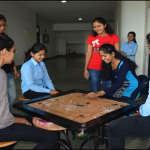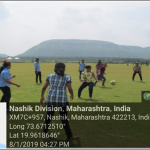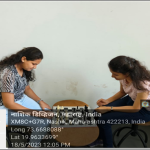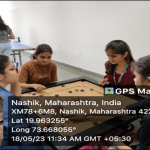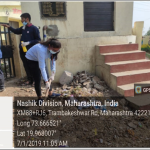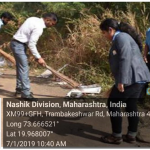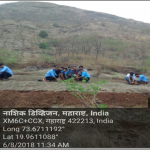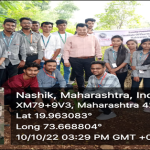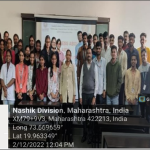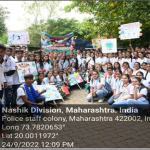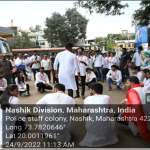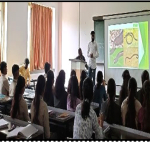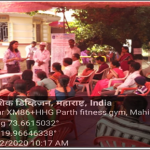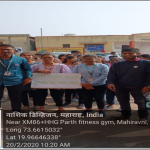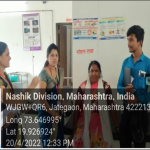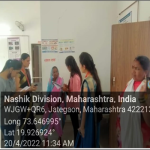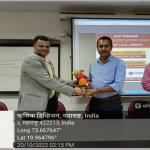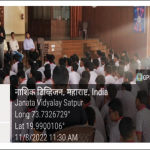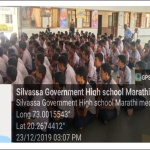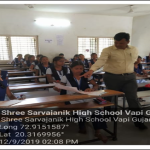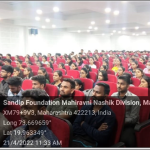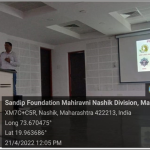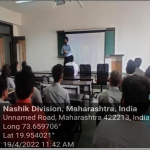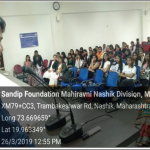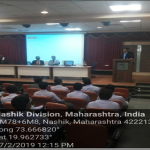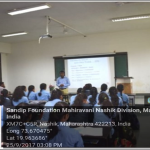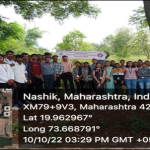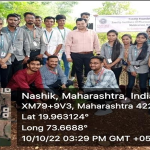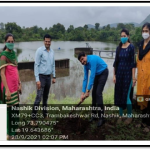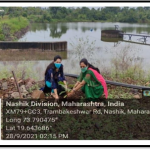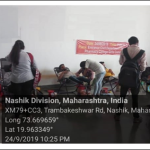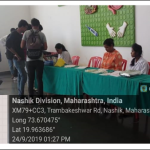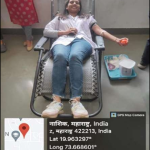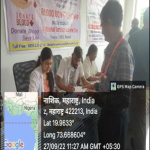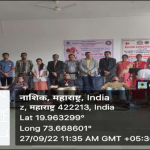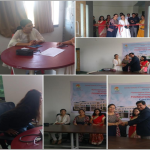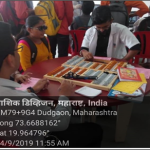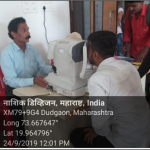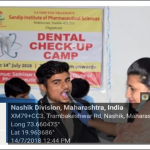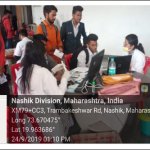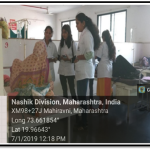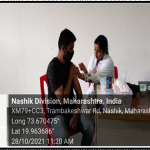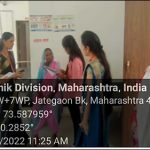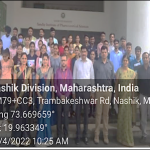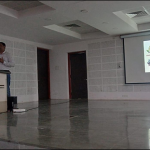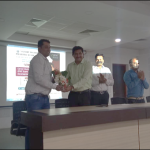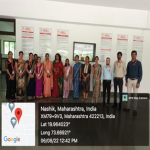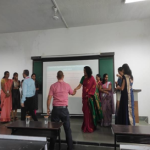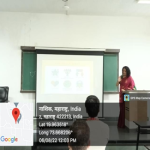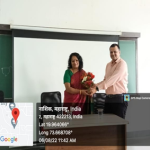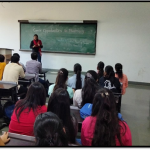Title of the practice: Harmonious development of the students
Objectives:
- To improve professional practical knowledge and technical
- To inculcate Soft skills.
- To involve students in community health service and social
- To inculcate green and eco-friendly practices
Expected outcome:
- Professional values and social responsibilities in students
- Better placement opportunities
- Eco consciousness in students and faculties
- Understanding socio economic diversity
- Self-reliability
The Context:
Harmonious development in simple terms means all round development. In present scenario, most of the educational institutions are facing challenges in getting placements, lack of self-reliability, eco consciousness, professional values and social responsibilities which are presently need of an hour. These basic values assure overall development and lead the students towards excellence. SIPS has undertaken various steps towards achieving excellence. The institute has made some outstanding decisions to provide overall growth of the students in order to make them confident, employable and responsible citizens. The college organizes various curricular activities like workshops, seminars, conferences, webinars and guest lectures. Institute also arranged professional visits to hospitals and industries, coordinates extracurricular activities through NSS which helps in their overall growth.
The Practice
- Practical skills and technical competence: SIPS arranges various workshops, seminars, hands on training to improve the practical skills and technical knowledge of the students. We provide basic and technical knowledge to our students about various pharmaceutical instruments. Institute has well equipped central instrumentation laboratory and machine room with modern equipment’s. This improves professional practical knowledge and technical skills of the students
- Industrial visits: Industrial visits arranged for the students will update them on the current practices in the pharma industries
- Research: SIPS encourages and support students and faculties financially for conducting Research projects, patents and publications which motivates them to upgrade their knowledge and accomplish professional
- Sports facilities & Health awareness: Institute has provided facility for gym, green gym, table tennis, cricket, football and volleyball carom and wrestling facilities. We organize yoga, and health checkup camps for nearby villages. Co-curricular and Extra-curricular/Extension activities will also conducted.
- Evidence of successes: Better exam scores, fewer dropouts, higher participation in curricular and extracurricular activities, healthy competition in the events and entrance exams are examples of success indicators. Academic success alone is not necessarily a reliable indicator of a student’s holistic growth, thus further proof can be presented, as in the examples below
- Active student participation in NSS extension activities, intra- and extra-mural activities can be viewed as a sign that students are overcoming their prejudices while enhancing skills.
- Success in Entrance exam: The results of entrance exams (like GPAT, NIPER, IELTS, MBA and TOEFL) and the number of students appearing for the same can be viewed as indicator of student’s curricular (academic) growth. Many of our undergraduate students have taken up post-graduation to pursue higher education and oversees education
- Students excelled in technical skills and competence is observed through increase in number of placement. Students fetched placements in various elite
Problems encountered:
Sometimes it is difficult to coordinate with all the students.
Resources required:
Finance is the major resource required which the institute sometimes cannot afford.
Extracurricular activities Sports
Title of the practice: Contributing towards health care system for the wellbeing of the society
Objectives/Intended outcome
- To inculcate social responsibility about health and hygiene among students.
- Being Health Care Professionals, students need to be educated to serve the society.
- To conduct health awareness camps, patient counseling in association with hospitals.
- To organize seminar, webinars, workshops, conference related to health awareness.
- Training the students for first aid in case of emergencies.
The Context
In India health management is a serious leading issue. This also is true globally. It becomes a responsibility of all health professionals to support the society in managing the health related issues including prevention and treatment of communicable and non-communicable diseases. With this context, SIPS has initiated best practice to serve the society to educate the people towards better health.
The Practice
- SIPS frequently organize health checkup camps at Mahiravani, Jategaon and other surrounding areas of our Institutes in association with hospitals, clinics and NSS.
- Students of SIPS conduct awareness programs, rallies and street plays to educate the public regarding importance of good health, its management, basic practices to prevent and treat the seasonal diseases and life style diseases.
- During COVID-19 pandemic, SIPS has provided campus with COVID Care Centre facility. COVID vaccination drive was also conducted by the institution.
Evidence of success
- Vaccination drive has given the opportunity to public for easy access to vaccination targeting the immunity towards COVID-19.
- Providing the campus as COVID care center has helped and benefited the people during pandemic.
- Long term and continuous practice of awareness among public is expected to educate the society towards better health and hygiene.
- Students gained skill, knowledge and leadership qualities which was evident through their participation in various activities conducted .
- Participation of public in health checkup camp was improved and this is an evidence that people became aware about the importance of health care.
Problem encountered:
- It is quite difficult to convince the people since many are not educated enough
- Students need to be more communicative to convince the people
Resources required:
- Financial assistance
- Association with multispecialty hospitals and their voluntary service is required
Swachh Bharat Abhiyan
Tree Plantation
AIDS Day Awareness
World Pharmacist Day
Tobacco Awareness
Patient Counseling Camp
Carrier Guidance Seminar
Fostering Social Consciousness and Community engagement
Main goal of education is to provide knowledge and skill through personal development of physical, social, intellectual, and emotional abilities which finally helps to build a healthy society and a healthy nation. To achieve the goal, it is essential to promote community service learning activities so that the students see themselves as more socially responsible citizens. The National Education Policy (NEP) announced by the Government of India in 2020 has presented a transformative framework for higher education in the country. It has reinforced many of the recommendations as exemplified through the below lines: “The purpose of the education system is to develop a good human being capable of rational thought and action, possessing compassion and empathy, courage and resilience, scientific temper and creative imagination, with sound ethical moorings and values. It aims at producing engaged, productive, and contributing citizens for building an equitable, inclusive, and plural society as envisaged by our Constitution”.
As a part of one of the operational guidelines to the above mentioned subject our institution it is also said that, “A quality higher education must enable personal accomplishment and enlightenment, constructive public engagement, and productive contribution to society. It must prepare students for more meaningful and satisfying lives and work roles and enable economic independence”. With this objective SIPS has initiated many activities to involve students in community engagement and working towards maintaining social values. Following are the practices we follow at SIPS
- Eco-consciousness and eco-friendly practices: The institute has been maintaining greenery with lawns, shrubs and trees for keeping environment healthy. There are more than 700 trees and around 50,000 shrubs surrounding the institute. Our campus is proud to feature a state-of-the-art check dam facility, designed to optimize water management and harness the benefits of sustainable water conservation practices including water percolation to the neighborhood farming areas. Sprinkler irrigation system is used for distribution of uniform water. Motivational slogans are displayed in campus in favor of green campus. Chief Guests are felicitated with herbal saplings or flowering plants. Students are made aware about environmental conservation through the subject of environmental science & by arranging environmental tours.
- Helping hand/community engagement: Institution has provided free sanitizers and face masks to the surrounding community during Covid-19 pandemic. Devotees during traditional Wari are provided with free food every year. Students engage themselves in helping the neighborhood village in cleaning the drainage through NSS.
- Health checkup camps: Our Institutes organizes various health check-up camp/s such as dental check-up, eye check-up, Women’s health check-up camps for the campus faculties and the nearby public. Sandip Institute of Pharmaceutical Sciences organized free “Dental Check-up Camp” with the help of renowned dental specialists from Nashik whereby the public will receive the advice from the doctors about dental hygiene and about the food intake and daily routine they should follow to prevent dental disorders and the available treatment options.
- Blood donation Camp: Sandip Institute of Pharmaceutical Sciences has organized blood donation camps in coordination with hospitals and blood bank. During the camp, doctors/technicians explain the students about the method of collection of blood and separation of blood constituents, blood group detection techniques and importance of blood donation. Any queries related will be clarified by the team on the spot. The camp has helped many needy patients during emergency. We also donate blood on request from hospitals or from patients.
- Patient counseling: Our students visit to the nearest Hospitals and Primary Healthcare Centres in the nearby villages like Mahiravani, Jategaon etc. and counsel the patients with the help of the physicians which gives an additional psychological support to the patients and extended awareness regarding the prevention and treatment of various illness in addition to the diet plan.
- Swachh Bharat Abhiyan: Swachh Bharat Abhiyan (SBA) or Swachh Bharat Mission (SBM) or Clean India mission is a campaign in India that aims to clean up the streets, roads and Infrastructure of Indian cities, smaller towns, and rural areas. The main aim of the mission is to eliminate open defecation and improve the waste management. SIPS arranged Swachh Bharat Abhiyan campaign in the campus as well as outside the campus and extend its services in maintenance of cleanliness in surrounding area. Sandip foundation has also taken the responsibility of maintaining the roadside plants of nearby area.
- Community Awareness for prevention of tobacco and alcohol consumption: Tobacco smoking and consumption can lead to lung cancer, chronic bronchitis, and emphysema. We initiated program bring awareness on the ill effects of alcohol and narcotics.
- Arranging Career guidance program and Placements to public: SIPS arranges carrier guidance programs for the students by experts from various fields which helps the seekers to choose and excel in their carrier. This also enhances the choice and opportunities for the students in getting placements in their field of interest.
- Plantation Program: SIPS conducts plantation programs and has taken the responsibility maintaining plants roadside nearby the campus.
SIPS is planning to begin new value added course on “Community Engagement and Social Responsibility” from the coming academic year as per the guidelines of NEP 2020, Fostering Social Responsibility & Community Engagement in Higher Education Institutions in India 2.0. which may be a valuable contribution from SIPS to adopt a holistic and functional approach to community engagement, encompassing all three functions of HEIs—teaching, research and service as per UGC’s ambitious Quality Mandate launched in 2018 on improving societal linkages of HEIs and enabling students to become socially productive.
Fostering Social Consciousness and Community engagement
Main goal of education is to provide knowledge and skill through personal development of physical, social, intellectual, and emotional abilities which finally helps to build a healthy society and a healthy nation. To achieve the goal, it is essential to promote community service learning activities so that the students see themselves as more socially responsible citizens. The National Education Policy (NEP) announced by the Government of India in 2020 has presented a transformative framework for higher education in the country. It has reinforced many of the recommendations as exemplified through the below lines: “The purpose of the education system is to develop a good human being capable of rational thought and action, possessing compassion and empathy, courage and resilience, scientific temper and creative imagination, with sound ethical moorings and values. It aims at producing engaged, productive, and contributing citizens for building an equitable, inclusive, and plural society as envisaged by our Constitution”.
As a part of one of the operational guidelines to the above mentioned subject our institution it is also said that, “A quality higher education must enable personal accomplishment and enlightenment, constructive public engagement, and productive contribution to society. It must prepare students for more meaningful and satisfying lives and work roles and enable economic independence”. With this objective SIPS has initiated many activities to involve students in community engagement and working towards maintaining social values. Following are the practices we follow at SIPS
- Eco-consciousness and eco-friendly practices:
The college has been maintaining greenery with lawns, shrubs and trees for keeping environment healthy. There are more than 700 trees and around 50,000 shrubs surrounding the institute.
Sprinkler irrigation system is used for distribution of uniform water. Motivational slogans are displayed in campus in favor of green campus. Chief Guests are felicitated with herbal saplings or flowering plants. Students are made aware about environmental conservation through the subject of environmental science & by arranging environmental tours.
- Helping hand/community engagement:
SIPS provide medical help by arranging blood donation camps and students are trained to provide first aid and primary treatment in case of emergency. Sandip Institute of Pharmaceutical Sciences extended its hands to fight against Covid-19pandemic. Institution has organized; Vaccination drives at college premises in collaboration with Primary Health Centre (PHC), Jategaon, Nashik,
- Health checkup camps:
Our Institutes organizes various health check-up camp/s such as dental check-up, eye check-up, Women’s health check-up camps for the campus faculties and the nearby public. Sandip Institute of Pharmaceutical Sciences organized free “Dental Check-up Camp” with the help of renowned dental specialists from Nashik whereby the public will receive the advice from the doctors about dental hygiene and about the food intake and daily routine they should follow to prevent dental disorders and the available treatment options.
- Blood donation Camp:
Sandip Institute of Pharmaceutical Sciences has organized blood donation camps in coordination with hospitals and blood bank. During the camp, doctors/technicians explain the students about the method of collection of blood and separation of blood constituents, blood group detection techniques and importance of blood donation. Any queries related will be clarified by the team on the spot. The camp has helped many needy patients during emergency. We also donate blood on request from hospitals or from patients.
- Patient counseling:
Our students visit to the nearest Hospitals and Primary Healthcare Centres in the nearby villages like Mahiravani, Jategaon etc. and counsel the patients with the help of the physicians which gives an additional psychological support to the patients and extended awareness regarding the prevention and treatment of various illness in addition to the diet plan.
- Swachh Bharat Abhiyan:
Swachh Bharat Abhiyan (SBA) or Swachh Bharat Mission (SBM) or Clean India mission is a campaign in India that aims to clean up the streets, roads and Infrastructure of Indian cities, smaller towns, and rural areas. The main aim of the mission is to eliminate open defecation and improve the waste management. SIPS arranged Swachh Bharat Abhiyan campaign in the campus as well as outside the campus and extend its services in maintenance of cleanliness in surrounding area. Sandip foundation has also taken the responsibility of maintaining the roadside plants of nearby area.
- Community Awareness for prevention of tobacco and alcohol consumption: Tobacco smoking and consumption can lead to lung cancer, chronic bronchitis, and emphysema. We initiated program bring awareness on the ill effects of alcohol and narcotics.
- Arranging Career guidance program and Placements to public: SIPS arranges carrier guidance programs for the students by experts from various fields which helps the seekers to choose and excel in their carrier. This also enhances the choice and opportunities for the students in getting placements in their field of interest.
- Plantation Program: SIPS conducts plantation programs and has taken the responsibility maintaining plants roadside nearby the campus.
SIPS is planning to begin new value added course on “Community Engagement and Social Responsibility” from the coming academic year as per the guidelines of NEP 2020, Fostering Social Responsibility & Community Engagement in Higher Education Institutions in India 2.0. which may be a valuable contribution from SIPS to adopt a holistic and functional approach to community engagement, encompassing all three functions of HEIs—teaching, research and service as per UGC’s ambitious Quality Mandate launched in 2018 on improving societal linkages of HEIs and enabling students to become socially productive.
Tree Plantation
Blood Donation Camp
Dental Check-up Camp
Gynaecological Check-up Camp
Eye check-up
Dental checkup camp
Medical camp for villagers
Covid-19, Vaccination Campaign.
Patient counselling at Primary Health Centre, Jategaon
Swachh Bharat Abhiyan
Career guidance, GPAT exam Preparation and Development of Softskill
Guest lecture on Soft Skill in Professional Development
Guest lecture on Career Opportunities in Pharmacy
Sandip Institute of Pharmaceutical Sciences is dedicated to giving students a thorough and all-encompassing education that will enable them to become responsible members of society. The institute adheres to the curriculum set out by its affiliated university.
- Considering that the curriculum only briefly touches on cross cutting to sustainability, gender, human values, professional ethics, and the environment. The institute has included these intersecting topics into the curriculum through seminars, lectures, expert presentations, certificate programs, value-added courses, and outreach and extension initiatives. From the very beginning of their profession, beginning with their induction program, students are exposed to ethical concepts, human values, gender equity, environmental sustainability, and duties as citizens and professionals. The institution also intends to begin case studies and interactive exercises so that students may learn how to make moral decisions and the consequences of their action on individuals, organization and on the society as a whole.
- Gender equality, Human values, and Professional Ethics: SIPS promotes a thorough awareness of gender-related issues by acknowledging the significance of gender inclusion and equality. Pupils get instruction and encouragement to critically assess gender biases, discrimination in the classroom and workplace, gender inequities, and gender-based challenges, and to prevent, address, and resolve them with caution. The curriculum emphasizes professional ethics and human values in a variety of methods to help students become responsible members of society. These include social justice, human rights and duties, and human values and human values.
- Sustainability and the environment: The second-year SPPU curriculum includes an Environmental Science subject. The subject covers environmental issues, the need for sustainable behaviours, and the preservation and administration of natural resources. Field projects and case studies are assigned to students in order to teach them about the real-world challenges surrounding environmental concerns and to help them come up with likely sustainable solutions. The institution also intends to set up field trips in order to improve the quality of instruction. As a model for society, our school has implemented a number of initiatives to encourage and practice environmental consciousness on campus.
- In conclusion, SIPS has started a number of classes, events, group discussions, and initiatives to install human values in the profession and mold the professionals to make valuable and meaningful contributions to society in an effort to create professionals with intelligence and morals.
Professional with Human Values, Ethics and Social Responsibilities
- Value added courses/certificate courses
- Part of the curriculum
- Extracurricular activities/Extension activities/Outreach activities
- Seminars/workshops/Expert talks
- Group discussion
- Field studies/Field Visits
- Debates
- Celebration and Participation in various events of commemoration day

